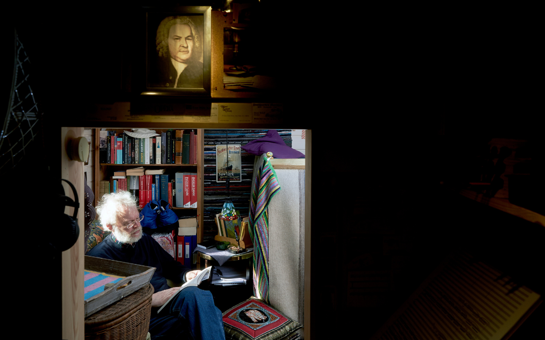- Poul Ruders
Symfoni nr. 2 (1996)
(Symphony no. 2)- Edition Wilhelm Hansen Copenhagen (World)
- 2.2.2.2/2.2.2.1+euph/2perc/epf/str(10.8.6.4.2)
- 28 min
Programme Note
Compared to my Symphony no. 1 (1989) number two calls for far smaller forces. It was commissioned by the Serge Koussevitzky Music Foundation in the Library of Congress for the New York City based chamber orchestra, Riverside Symphony, and it is far less outwardly dramatic and not "literary" at all (my first symphony had the subtitle Himmelhoch jauchzend - zum tode betrübt, a quotation from Goethe’s Egmont meaning "to heaven rejoicing - cast down until death").
My second symphony does have a subtitle, though: Symphony and Transformation, thus emphasizing the fact that the piece is a symphony as well as a musical and spiritual state in constant transformation, a patient and seamless journey from pure melody and polyphony towards pure rhythm. The subtitle is borrowed from - and inspired by - a full evening ballet by Danish choreographer Anna Lærkesen, to music by Carl Nielsen and my own Violin Concerto no. 2. However, my second symphony does not draw from the music of the ballet at all; rather it is the mere beauty of the concept "symphony and transformation" and the various related associations which led me to choose this subtitle.
Whereas my first symphony summed up twenty years of compositional endeavour, the second symphony marks the conclusion of a series of quite introverted and inwardlooking pieces written in the past four years: Cello Concerto no. 2, Anima, Viola Concerto, Piano Concerto, compositions which all explore a technique of transformation, a personal compositional method, which I have dubbed minimorphosis.
All linear and development-aimed composition could be called transformation, and in the case of my most recent music, a lot of flashy bravura has given way to the more subtle transformation of what one hears at the start of a piece towards complete alienation, like a journey through a gallery of distorting mirrors: the farther we go the more significant the alterations we see in front of us, but it is still the same "original" walking by.
Being the composer I certainly know where I am going, but the audience should not.
- Poul Ruders, June 1996
My second symphony does have a subtitle, though: Symphony and Transformation, thus emphasizing the fact that the piece is a symphony as well as a musical and spiritual state in constant transformation, a patient and seamless journey from pure melody and polyphony towards pure rhythm. The subtitle is borrowed from - and inspired by - a full evening ballet by Danish choreographer Anna Lærkesen, to music by Carl Nielsen and my own Violin Concerto no. 2. However, my second symphony does not draw from the music of the ballet at all; rather it is the mere beauty of the concept "symphony and transformation" and the various related associations which led me to choose this subtitle.
Whereas my first symphony summed up twenty years of compositional endeavour, the second symphony marks the conclusion of a series of quite introverted and inwardlooking pieces written in the past four years: Cello Concerto no. 2, Anima, Viola Concerto, Piano Concerto, compositions which all explore a technique of transformation, a personal compositional method, which I have dubbed minimorphosis.
All linear and development-aimed composition could be called transformation, and in the case of my most recent music, a lot of flashy bravura has given way to the more subtle transformation of what one hears at the start of a piece towards complete alienation, like a journey through a gallery of distorting mirrors: the farther we go the more significant the alterations we see in front of us, but it is still the same "original" walking by.
Being the composer I certainly know where I am going, but the audience should not.
- Poul Ruders, June 1996
Media
Scores
Score preview
Discography
Symphony No 2 - Piano Concerto

- LabelDacapo
- Catalogue Number8.224125
- ConductorMichael Schønwandt / Marcus Stenz
- EnsembleDanish National Symphony Orchestra
- SoloistRolf Hind (piano)
- ReleasedMarch 1999
More Info

- World Premiere of Poul Ruders' new symphony
- 12th November 2024
- Odense Symphony Orchestra presents the World Premiere of Poul Ruders' 'Symphony No.6'

 Located in the UK
Located in the UK
 Located in the USA
Located in the USA
 Located in Europe
Located in Europe